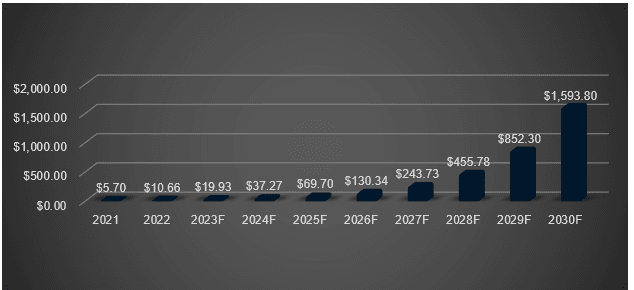Blockchain in Marine Industry
Blockchain technology can have numerous applications in the shipping industry (although it is a newcomer in blockchain technology) as it provides transparency, security, and cost reduction in financial transactions. Although at its early steps, this technology has been applied in the shipping industry.
How Blockchain helps in boosting marine industry
- Shipment tracking Traditional tracking methods are often slow. Blockchain technology allows you to access your data anytime, anywhere. This makes it easy to manage your shipments in real time.
- Smart bills of lading Blockchain tracks shipments easily and in real time. Documents on the blockchain are also securely protected, so you can save on courier costs and never worry about losing your documents.
- Smart contracts as you know, shipping business transactions are expensive and time-consuming. About 20% of the operating budget is due to poor information and data management.
- Smart contracts can address critical issues such as payment processing and shipment tracking. And they are paperless: Bonus!
Tracking and tracing fuel quality Cargo ships use fossil fuels that emit CO2, sulfur oxides and other greenhouse gases. Blockchain technology makes it possible to trace the origin of fuel. Imagine how much better industry accountability and regulation this would make.

BLOCKCHAIN TECHNOLOGY MARKET SIZE, 2021 TO 2030 [USD BILLION]
The global blockchain technology market size is estimated at US$ 5.7 billion in 2021 and will grow to approximately US$ 1,593.8 billion by 2030, with a CAGR of 87.1% during the forecast period from 2022 to 2030.
Metamorphosis of Marine industry in blockchain
First-Ever Bill of Lading Issues with Blockchain Technology The first container processed with the revolutionary new blockchain-based CargoX Smart Bill of Lading™ has been successfully released at the port of Koper, Slovenia (EU).
The bill of lading for this cargo is issued electronically and is transmitted in just minutes instead of days or weeks using a highly secure and reliable public blockchain network, preventing loss, theft or loss of the bill of lading.
World’s First Shipping Transaction on Ethereum Blockchain 300cubits announced the successful completion of the first test delivery of smart contracts deployed on the Ethereum blockchain. TEU tokens held as reservation deposits on the blockchain were successfully returned to users upon receiving port EDI messages on textile shipments.
Maersk And IBM Introduce TradeLens Blockchain Shipping Solution AP Moller – Maersk and IBM announced the creation of TradeLens. It is a blockchain-enabled shipping solution designed to facilitate more efficient and secure global commerce, bring diverse stakeholders together to support information sharing and transparency, and foster innovation across industries.
As part of the TradeLens Early Adopter Program, IBM and Maersk also announced that 94 organizations are actively participating or have agreed to participate in the open standards based TradeLens platform.
The World’s First Marine Insurance Blockchain Platform Launched EY and Guardtime have launched the world’s first blockchain platform for the marine insurance sector. The platform was developed by A.P. Møller-Maersk A/S, ACORD, Microsoft, MS Amlin, Willis Towers Watson, and XL Catlin after a 20-week proof of concept.
How does blockchain shipping contribute to sustainability?
Tracing fuel quality through blockchain shipping Blockchain technology tracks the origin and movement of fuel, allowing ships to use the cleanest options possible. How? A platform that allows users to access safe and accurate fuel information. And share it with everyone on your network. This allows users to check the quality of their fuel data and ensure IMO (International Maritime Organization) compliance.
Key Trends & Innovations
Marified offers Seafarer e-Passports Singapore startup Marified offers e-passports for seafarers. The startup’s blockchain-based platform allows users to publish, store, manage and review documents. Documents are stored on the blockchain so authorities can guarantee protection against counterfeiting. It enables ship managers, training centers and seafarers to increase efficiency and reduce document processing costs while improving the safety of life at sea.
Thrymr Digital Insurance Solutions (TDIS) simplifies Marine Cargo Insurance TDIS is a German startup that provides a marine cargo insurtech platform. The blockchain-powered platform automates marine cargo insurance processes, from certificate generation and verification to policy management, accounting, and compliance screening. This accelerates insurance data exchange between maritime companies and, in turn, optimizes communication between insurers, underwriters, and brokers.
Conclusion
There are several challenges that prevent blockchain technology from being implemented across the industry. Chief among these is cost and limited technical training. The success of blockchain depends on the existence of a standardized end-to-end digital infrastructure across the supply chain and the consent of all stakeholders to use open APIs across data interfaces. Done right, blockchain can bring much-needed time and cost savings to the shipping industry.
For more detail Contact:
UnivDatos Market Insights
C80B, Sector-8, Noida,
Uttar Pradesh 201301
For Sales related query, please reach us at [email protected]
